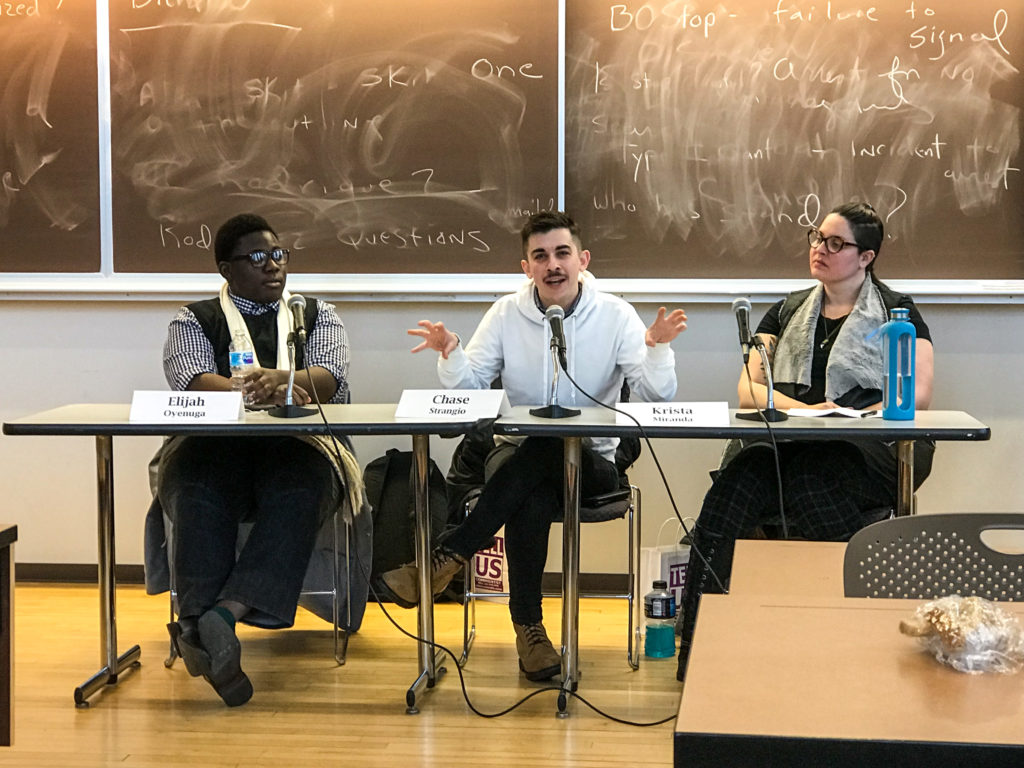Law school panel talks transgender rights, “politics of the toilet”
February 15, 2018
Law students and professors gathered over sandwiches Wednesday to hear a roundtable discussion on the social and legal implications of transgender anatomy.
The event, which was held as part of the Daynard Distinguished Visiting Fellows Program at the Northeastern School of Law, featured ACLU attorney and NU Law alumnus Chase Strangio, who has worked on multiple high-profile cases involving trans rights — including representing transgender ex-soldier Chelsea Manning. Alongside Strangio were visiting lecturer Krista Miranda and local LGBTQA+ activist Elijah Oyenuga.
Moderated by Northeastern law professor Libby Adler, the conversation was wide-ranging, but mainly centered on issues transgender people face because of their anatomy, which Miranda dubbed “the politics of the toilet.”
Strangio reflected on the current state of transgender rights and the disconnect between perceptions and realities of trans bodies.
“We haven’t done a good job as advocates with grappling with the ways that our bodies have a variety of needs and a lack of wholeness along the coherent sexed-embodiment narrative that both law and medicine are really attached to.”
Strangio and Oyenuga, both trans men, touched upon personal experiences of body-related discrimination.
“I live in a body that doesn’t line up in coherently-sexed ways,” Strangio said. “This is most acute for me when I go to the gynecologist, which is something I don’t think anyone likes to do, but it’s particularly unpleasant when you’re not female.”
Oyenuga has experienced a similar lack of accommodation in medical settings.
“When I’m getting an STD test, one of the things they do is swab the vagina, but I couldn’t get that test done and processed through the system because my system says male, so they had to put it in as an anal swab,” he said.
Strangio, who worked on the Gavin Grimm transgender bathroom case in Virginia, went on to expound on Miranda’s “toilet politics.”
“The politics of the bathroom is such a central theme in most conversations of social change,” Strangio said. “The public bathroom is often a site in this country where people have to be in closer contact with people who they are uncomfortable with than in other places, and so the politics of the bathroom becomes a sort of politics of discomfort and exclusion.”
Ultimately, the dialogue shifted toward reform, with Strangio drawing upon his background in legal advocacy.
“Our bodies, even though they are experiencing a multitude of overlapping forms of discrimination and violence, are at odds with our ability to seek political power,” he said. “I’m really interested in a political and legal strategy that accounts for the variety of ways that our bodies operate in the world, interact with other people, and have health needs that don’t obscure the coherence of a certain bodily existence.”
Ienna Dela Torre, a second-year law student who attended the discussion, echoed Strangio’s call for institutional change.
“We need to be making space for these kinds of discussions to allow trans folks to be able to engage in their full humanity as people in the law, and the law continuously fails to do that,” she said.
Oyenuga, a second-year student at Lesley University, came away from the event wanting to learn more.
“My biggest question is ‘how do we turn [reform] into law?” he said. “We’re talking about this in a law school — we’re not talking about this in a liberal arts college where all of this is just philosophy.”
Ultimately, Oyenuga seeks to follow in the footsteps of his fellow panelist.
“As someone aspiring to be a lawyer, I’m thinking about the legal aspects and what legal ramifications would take place afterward.”







